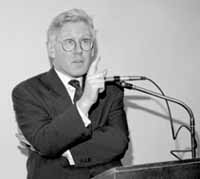Rae and the rabbi on federalism
by Sylvain Comeau
 |
University of Toronto professor and former premier of Ontario Bob Rae delivered this year's James R. Mallory Lecture in Canadian Studies
[ PHOTO: OWEN EGAN ] |
One of the most honoured scholars in Jewish history was the Rabbi Hillel, born in Babylonia in the first century BC. A lawyer and teacher noted for his tolerance, Hillel's most enduring words exist in the form of three questions: If I am not for myself, who will be for me? And if I am for myself alone, what am I? And if not now, when?
Hillel was a member of the Pharisee sect, which took its name from a Hebrew word meaning "separate." Last Thursday, former Premier of Ontario Bob Rae, now a lawyer and teacher, chose Hillel's three questions to shine a light on Canada's ongoing constitutional crisis.
The rabbi's first question states the common sense case for self interest, according to Rae. He added that the efforts of French-Canadians and other groups to protect their self interest is understandable--even laudatory.
"In the era of the politics of identity, we see literally hundreds of groups and thousands of individuals who feel the need to advocate their self interest as members of a group. And one of the central messages of the Canadian experience is that there is nothing wrong or unnatural about this; everyone is entitled to express their identity and self interest."
French-Canadians deserve the same courtesy, said Rae. "It is entirely understandable that Quebecers should be loyal to their own faith, to their own language, and to their own way of life. If Quebecers had not been determined to preserve their language and culture, had not insisted on their own self interest, and had not pursued that self interest with a remarkable and commendable vigour throughout history, who would have?"
However, the rabbi's second question, which is intended to point out the limits of self interest, presents a strong caveat to the politics of identity. Rae objects when absolutism enters the discourse of groups like the sovereignists.
"The arguments and the rhetoric of those advocating the break-up of the country, or of independence for Quebec, would have you believe that Canada is scarcely a federation at all, and that there is a doctrine called sovereignty, which is absolute, and which has no limits or boundaries."
On the contrary, Rae said he would argue that nothing--not sovereignty or federalism--is absolute.
"Federalism means, quite simply, 'We're sovereign in some areas, others are sovereign in other areas, and these sovereignties are not absolute.' They are limited by law and by circumstance.
"Canada's discovery of the federal principle has been born of the simple fact that none of us is completely sovereign; we do not live in a world in which we can say that we have the free and absolute power to do as we please, either as individuals or as groups. That's why the rabbi's second question is so relevant to our historical experience, and to where we must go in the future."
Rae feels that extremist rhetoric and hard-line positions will have to yield to the spirit of compromise.
"If Canada were to break up, we would simply have to reinvent it again. No one seems to be looking for the complete break-up of the country; whenever I use that phrase, I'm always told (by sovereignists), 'No, that's not what we're asking for.'
"If not, then they are seeking to renegotiate the nature of the partnership, to rework what should be federal and what should be provincial--which sovereignties should apply in which ways. These would be points for negotiation, in which, inevitably, there would be concessions and compromises. No one goes into a negotiation expecting to get everything one asks for at the beginning. Not if one hopes to be successful."
But what should the government do on the unity issue before the question raises its problematic head again? Rae pointed to the rabbi's third question, which is intended to inject a note of urgency and immediacy to the first two questions.
Hillel believed that the present is the time to begin looking out for one's own self interest, but that it should be balanced with the interests of others. Rae urged that the government start talking now about how to balance the competing interests in the constitutional debate.
"This is the politician's least favourite question. The federal government seems to feel that the best course is 'let sleeping dogs lie,' and they would clearly prefer to lead from well behind the pack."
For Rae, continued silence on major constitutional issues--distinct society for Quebec, the aboriginal nations, Senate reform--is the most dangerous course.
"We have already paid a very high price for letting a sleeping dog lie when we discovered that, in fact, the dog was wide awake, and ready to bite. So it's not good enough to say 'We'll put all of it off for another day. We'll wait for a more convenient moment.' These issues are before us now."
Rae's lecture was presented by the McGill Institute for the Study of Canada.